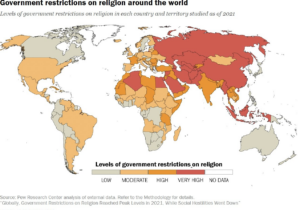Last week the State Department hosted its second Ministerial to Advance Religious Freedom, which was the largest human rights summit in Foggy Bottom history and the largest government-led summit ever devoted to religious freedom. The vice president and the secretary of state addressed the gathering, emphasizing the United States’ commitment to the cause of ending religious persecution.
It is hard to overstate the scope of the ministerial, with 106 countries and 186 speakers participating across the three-day event. The ministerial also spawned over 80 related events across the capital city, on subjects ranging from China’s crackdown on the Uighur Muslims to the Hungarian government’s focus on protecting persecuted Christians. The ministerial also entailed the secretary announcing the formation of a new international body called the “International Religious Freedom Alliance” (IRFA), and the announcement by six other countries that they too will host religious freedom focus summits.
The ascendancy of religious freedom, or freedom of conscience, in US foreign policy is striking if only because for so long it seemed unlikely. Addressing religious persecution at the State Department has historically languished under other more pressing foreign policy priorities. For example, the US has yet to recognize the Armenian Genocide, which turned into a regional genocide against Christian minority groups, deeming diplomatic relationships with Turkey too important to risk rocking the boat. The list goes on up to the Obama administration’s reticence to call the Islamic State’s brutal campaign of annihilation of Christians and Yazidis a genocide, only doing so after great pressure from external forces.
When Sam Brownback was sworn into his position as ambassador-at-large for international religious freedom, the issue was treated as the stepchild of US foreign policy. With the blessing of political support from the president and the secretary of state, Ambassador Brownback brought the issue into the spotlight. The ambassador’s right hand in this effort has been Knox Thames, the special adviser for religious minorities in the Near East and South/Central Asia, who referred to the ministerial as a moonshot-like event, permanently altering the trajectory of US engagement on issues of religious persecution.
There is a sort of logic to the rise of religious freedom at this moment in US foreign policy. The world is facing waves of religion-based violence and oppression, with 80 percent of those facing religious persecution being Christians. With the foreign policy consensus that President George W. Bush’s wars in the Middle East were the last gasp of the post-Cold War neoconservative experiment, followed by eight years of wandering in the wilderness under President Barack Obama, when America seemed to be constantly in retreat—there is a strong sense that America must begin to lead again on the international stage. But how it will do that has been unclear.
Returning to a founding American value, freedom of conscience is a wise and proper choice as our standard to carry abroad. It is wise in that it unites Americans in a time of deep political division; freedom to do with your soul what your conscience demands has been in our DNA since the Pilgrims landed at Plymouth. And it is proper in that it upholds a right from God that is universal to mankind. Vice President Mike Pence eloquently articulated the connection between the issue and national interest: “Free minds build free markets, and wherever religious liberty is allowed to take root it is prosperity and peace that ultimately flourish as well… [T]hose who deny religious freedom to their people often have few qualms denying those rights to others.”
The question, then, is whether this new US foreign policy priority will outlive the current administration or be a flash in the pan.
The answer will be determined by how the energy created by the ministerial is expended over the coming years, but Secretary Pompeo and Ambassador Brownback have made impressive strides already, convincing other nations to appoint permanent religious freedom ambassadors of their own and energizing an army of nongovernmental organizations around the world to begin local dialogues about religious freedom.
The announced IRFA is promising in this regard. It has the potential to be a sort of new NATO—not as a defense coalition to counter the spread of the Soviet Union, but an ideological organization to stand against the rising tide of violence toward minority faith communities around the world. The weapons in its arsenal are not strictly coordinating soft power and humanitarian aid, though those are certainly the backbone. Targeted sanctions and giving or withholding military aid are fair game in current US foreign policy and should be an aspect of the IRFA. Building this alliance to last, and pairing it with the invaluable legitimacy that a US blessing gives to a foreign religious freedom NGO, could be the blueprint to permanently rewire US foreign policy for a new era of religious persecution.







 Sponsor a student for Christianity & National Security 2024
Sponsor a student for Christianity & National Security 2024